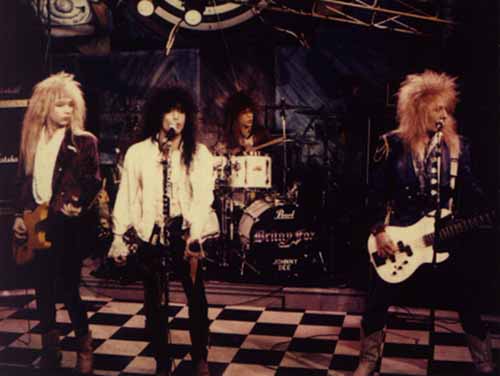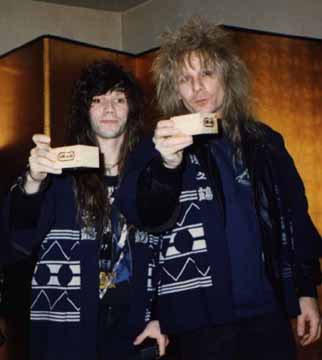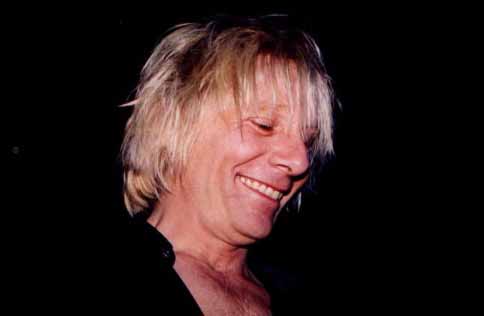FIB MUSIC: You don't get any royalty payments from the sales?
Billy: Nah. It's been a long time.
FIB MUSIC: Who owns the rights to those recordings?
Billy: Well, anything that we did on Sony / Columbia, they still own it.
FIB MUSIC: That's amazing, because I would think you guys recouped expenses on the first
album.
Billy:
Well....I don't believe according to the paperwork.
FIB MUSIC: Isn't that amazing?
Billy: Yeah, it's funny how that always seems to work out. I think there are about two
dozen bands that have ever recouped. You have to be Bon Jovi to recoup in this business. We were drawing a lot of tour support, you know, we
were borrowing a lot of money from them. That's what a record company is basically, a big fucking loan company. All they do is loan
you money and make money off your shit. It wasn't quite what I thought it was going to be...I remember that.
FIB MUSIC: Any cool moments stand out from the self-titled recording sessions?
Billy: Oh, I don't know. It was pretty boring to tell you the truth.
FIB MUSIC: Where was it recorded?
Billy: We did a lot of the stuff down here. We did the rhythm tracks at the Warehouse in
Philadelphia and then we went to the House of Music, up in Jersey. That's where we finished it up.
FIB MUSIC: How long did it take to record and what was the recording budget?
Billy: I think it took about two months. The recording budget....I think was pretty cheap.
I think it was about sixty or seventy thousand.
 FIB MUSIC: Wow. That was pretty cheap for back in the day. You guys should have easily recouped with
that kind of budget. Didn't that album go platinum?
FIB MUSIC: Wow. That was pretty cheap for back in the day. You guys should have easily recouped with
that kind of budget. Didn't that album go platinum?
Billy: Well, that was the part that always confused me. Here's what I think happened. We
were up to like 900,000 or something like that and we had just put out a third video.... a ballad, but it really kind of stunk actually.
It died and didn't do much. So instead of doing another video.....I mean we were still playing, touring and doing shit, but they
pulled the plug on it. And I still think to this day, that the reason they did that was because if you go platinum, you can
renegotiate and I don't think that they thought we would go much past platinum and then we would have probably wanted to
renegotiate. So to avoid a big hassle, I think they kind of conspired to keep us under platinum, if you know what I mean.
FIB MUSIC: Who were some of the bands that you toured with to support the self-titled release?
Billy: Poison, Bon Jovi, Joan Jett, Ratt, Kix, Danger Danger, Bang Tango, Great White....no that was the second album,
Lita Ford.
FIB MUSIC: Any cool moments stand out from that tour?
Billy: Oh you know, they're all the same, typical rock star moments, bang two chicks in a hot tub. You read
about somebody throwing shit out a window....I probably did that too at some point. (laughs)
FIB MUSIC: How about any moments from the tour, or playing with the bands, or any
shows stand out? Beyond the groupie stuff, are there any favorite moments?
Billy: Well the whole experience was just amazing. It is hard to quantify it with just
one experience, you know? You kind of had to take it as a whole. I guess the one thing I loved about it was the travel. Going
back and forth to Japan and Europe. Flying all over this country. I always enjoyed the playing (live). I don't remember ever being
nervous. When we were doing our first arena gigs, people were like, so I guess you're going to be nervous now. But for some
reason, I never felt nervous, I really felt we belonged here, you know? And once again, the best times for me was that six month window, between thinking
we were going to be successful and signing our deal. It still being fun. Those van tours were a blast.
FIB MUSIC: What was it like working with Dean Davidson?
Billy: It's tough. You absolutely had to do things on Dean's terms. But if you do what
your supposed to do and he's got a half decent idea, you're going to come out with a good song. No everything was good, but your chances
are good that he'll come up with a pretty good idea. It's business, you don't let personal shit get in the way of that.
FIB MUSIC: But he was like that before you guys got signed?
Billy: Well it was all really professional from the beginning. We weren't friends that
decided to form a band. We were guys who had the same goals in mind and you need other people to make that happen. And we were
just the people that were there at that time. Although, I had crossed paths with Dean & Mike, I had never met Tony before. But we
were never a band that hung out together, we would always go our separate ways.
FIB MUSIC: It was even like that after you guys were signed?
Billy: Absolutely. You know, it's tough when you take guys that are all so different from
each other and all of a sudden they're living on top of each other, ten months on a tour bus & hotels & shit. It actually
aggravates it. So, I would say it got worse once we got our deal. But it wasn't really uncomfortable for anyone's standpoint, you know, it
was alright. It was really just Dean....things got worse with Dean.
FIB MUSIC: What was that about?
Billy: Well, you know, lead singer-idis. He just had a really bad case of it.
They get all ME, ME, ME....that's the nature of that beast. Some can control it, but he was just one that couldn't control it.
FIB MUSIC: ....and then suddenly he leaves the band?
Billy: Yeah, he left...he started some silly-ass fight and he left. But see, he
was walking into a deal with Polygram that was all being brokered behind our back. I mean looking back now, I think we could
have probably sued him, but that's not really my style anyhow.
FIB MUSIC: So they offered him another record deal to form Black Eyed Susan?
Billy: Yeah, he got a half million dollars that he put right into his pocket from that deal. So that
was why it was beneficial for him. But it still could have been done a lot better. They could have been done, so it didn't cost us
and everybody so much money. I mean, we would have made a lot more than that in gig money. I mean we had gigs lined up, that were
great paying gigs. And we had about eight months of that in front of us and if we wanted we could have booked another eight. So, him
leaving was very detrimental to the cash flow. So he signs to Polygram and Black Eyed Susan releases an album and absolutely drops
dead. It didn't sell anything and was considered a failure. But he still got the money. That was a long time ago...does he still
have the money? I don't think so. But I don't know what he is doing now, I haven't talked to him in quite awhile.
FIB MUSIC: Did you guys have a feeling that "Long Way to Love" was going to be such a big hit?
Billy: Well, I know that was the plan and that was the hope. I don't remember feeling completely
confident. I knew when we did the video and I saw all the shit that was in there, I felt pretty good about it. I do remember that the
first video budget was around the fifty to sixty grand range. Seemed like a lot to spend, you know? But then it started doing well and then
it started doing really well. Then Girlschool was next. Which Girlschool was pretty big, but I probably would have jammed something
else in there and then come back with Girlschool. Like I said before, I think there plan was to just hit quick. But we knew
that Girlschool would do well and personally I wasn't too crazy about it, because I thought from then on we would be known as the
Girlschool band. It was kind of bittersweet for me, but looking back who really cares, you have a chance to do it, then you should
do it. Then we release the ballad, which did not do well and that's when they pulled the plug on us. I would have done "Fun in Texas" as the
third video. One thing, we didn't get much radio. If you to watch MTV, you would have thought the biggest in the world were
Def Leppard, Poison, KISS, Britny Fox. In reality, they all got tons of radio, but we never did. That was what killed us. In the
beginning I think it was Dean's voice....I think we got kind of stigmatized. All of our success was due to video and touring.
FIB MUSIC: How were you living at that time?
Billy: Well, so much of our money went back into Britny Fox Incorporated. So when the
money dried up and there weren't any chunks coming in, we still had something to live off of and pay the bills and shit. But we just
put ourselves on a salary and occasionally we would get chunks of money in that we would split up and keep.
FIB MUSIC: But you did receive some royalties from album sales, right?
Billy: Oh yeah, back then....not as much as you would think. I mean a lot of its the writer's
royalties and Dean got all the credit for writing everything. We didn't realize the importance of that. We split our advance four
ways, as most bands do. But the money is in the publishing and we were too stupid to realize that, at least I was at any rate. But then
everybody else was to, because they didn't really make a fuss when Dean was screaming to get his name on everything. We were just like
whatever keeps the peace.
FIB MUSIC: Did he write everything?
Billy: He was absolutely the catalyst for a lot of those ideas. Did he write everything? No. But
he was so adamant saying, "I'm the writer, I'm the writer", and we were just like, whatever shuts this guy up. We're traveling the world being
rock stars, who cares, give him the fucking publishing. So split the chunk up front and put his name on everything..I'm sick of hearing it. So that's
how he became the creative mastermind. The reality is Dean would come in with this line and this riff and he would start playing it, then the
band would start playing it and then I would be like, go here and then everybody would go here and we would do it and then twenty minutes later
we would have the skeleton of the song laid out. That's how we did everything. So we were just putting these songs together, not
talking about the publishing, playing clubs and kicking ass, until the business side started and that's when Dean became so adamant. But no one
was really bringing ideas in, we figured what this guy seems to be doing is working, so knock yourself out. I didn't want to be Mr. Writer here, you're
the guy fucking doing it. We're riding around in a tour bus, we're doing something right, so keep it up. But every once in a while, we thought
we should be compensated for our ideas. If a song has four parts in it and Dean came up with the first one and I came up with the other
three, then I should get a credit for that, don't you think? But that is where the rope came in with Dean, so rather than fight about it, we just said
fuck it. What are the chances that this is going to be worth shit anyway.
FIB MUSIC: What's so bizarre is that Britny Fox was already his band, where he had complete creative
control. Yet, he leaves the band to start another.
Billy: It was....but unfortunately, all this nonsense played into his narcissistic side of him.
And when you start to feed a narcissus, forget it. I mean they're uncontrollable anyway. And then you put one of those people in the
position of being the lead singer in a successful band....Oh, my God. I could draw you a graph man, from the time to when we first
started and he wanted us to play with him; he was like a little kitten. And then as this band became more and more successful, he was
the biggest pain in the ass before we were even out of the clubs. The guy was impossible.
FIB MUSIC: But he was great in the beginning?
Billy: Oh absolutely, that's kind of his motive. When he needs you, when he's not doing so well,
he's the nicest guy in the world and you think, wow maybe this guy has changed. But I have found that people might change, but it's
really rare. And Dean has been one of those who has never really changed. It's always what he needs at that particular time, he will do.
If he needs to get a band around him, a good band and he wants to try to do this idea; you better believe he's going to kiss their asses.
But as the band gets bigger and it's obvious that no one is going to leave, that's when you see the real him start to come out. Ah, don't even
get me started on that. You can ask any of the other guys and they'll tell you the same story. But I remember that by the time Tony
had died, we were already starting to fight like cats and dogs.
FIB MUSIC: Any memories come to mind from the day you signed your record deal?
Billy: I remember the day we signed the record deal, was right on my birthday, which is November
20th. And after we signed, everyone was bullshitting, we were in New York and I go down and I'm thinking, "wow, it's really fucking crowded,
I wonder why it's so fucking crowded". And everyone is looking out the window and I look out the window and all of a sudden the huge
Christmas tree they got at Rockefeller Center just went off right in front of me. I was thinking, "wow, this is a pretty symbolic day,
it's my birthday, I just signed a fucking record deal with CBS and then that big fucking tree lights up in front of me".

Johnny Dee & Billy Childs
back in the day
|

